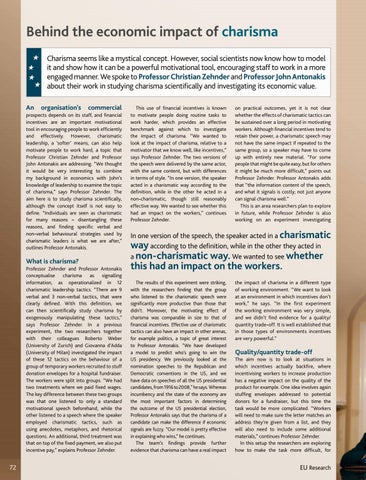Behind the economic impact of charisma Charisma seems like a mystical concept. However, social scientists now know how to model it and show how it can be a powerful motivational tool, encouraging staff to work in a more engaged manner. We spoke to Professor Christian Zehnder and Professor John Antonakis about their work in studying charisma scientifically and investigating its economic value. An
organisation’s
commercial
prospects depends on its staff, and financial incentives are an important motivational tool in encouraging people to work efficiently and effectively. However, charismatic leadership, a ‘softer’ means, can also help motivate people to work hard, a topic that Professor Christian Zehnder and Professor John Antonakis are addressing. “We thought it would be very interesting to combine my background in economics with John’s knowledge of leadership to examine the topic of charisma,” says Professor Zehnder. The aim here is to study charisma scientifically, although the concept itself is not easy to define. “Individuals are seen as charismatic for many reasons – disentangling these reasons, and finding specific verbal and non-verbal behavioural strategies used by charismatic leaders is what we are after,” outlines Professor Antonakis.
What is charisma? Professor Zehnder and Professor Antonakis conceptualise charisma as signalling information, as operationalized in 12 charismatic leadership tactics. “There are 9 verbal and 3 non-verbal tactics, that were clearly defined. With this definition, we can then scientifically study charisma by exogenously manipulating these tactics,” says Professor Zehnder. In a previous experiment, the two researchers together with their colleagues Roberto Weber (University of Zurich) and Giovanna d’Adda (University of Milan) investigated the impact of these 12 tactics on the behaviour of a group of temporary workers recruited to stuff donation envelopes for a hospital fundraiser. The workers were split into groups. “We had two treatments where we paid fixed wages. The key difference between these two groups was that one listened to only a standard motivational speech beforehand, while the other listened to a speech where the speaker employed charismatic tactics, such as using anecdotes, metaphors, and rhetorical questions. An additional, third treatment was that on top of the fixed payment, we also put incentive pay,” explains Professor Zehnder.
72
This use of financial incentives is known to motivate people doing routine tasks to work harder, which provides an effective benchmark against which to investigate the impact of charisma. “We wanted to look at the impact of charisma, relative to a motivator that we know well, like incentives,” says Professor Zehnder. The two versions of the speech were delivered by the same actor, with the same content, but with differences in terms of style. “In one version, the speaker acted in a charismatic way according to the definition, while in the other he acted in a non-charismatic, though still reasonably effective way. We wanted to see whether this had an impact on the workers,” continues Professor Zehnder.
on practical outcomes, yet it is not clear whether the effects of charismatic tactics can be sustained over a long period in motivating workers. Although financial incentives tend to retain their power, a charismatic speech may not have the same impact if repeated to the same group, so a speaker may have to come up with entirely new material. “For some people that might be quite easy, but for others it might be much more difficult,” points out Professor Zehnder. Professor Antonakis adds that “the information content of the speech, and what it signals is costly; not just anyone can signal charisma well.” This is an area researchers plan to explore in future, while Professor Zehnder is also working on an experiment investigating
In one version of the speech, the speaker acted in a charismatic way according to the definition, while in the other they acted in a non-charismatic way. We wanted to see whether
this had an impact on the workers. The results of this experiment were striking, with the researchers finding that the group who listened to the charismatic speech were significantly more productive than those that didn’t. Moreover, the motivating effect of charisma was comparable in size to that of financial incentives. Effective use of charismatic tactics can also have an impact in other arenas, for example politics, a topic of great interest to Professor Antonakis. “We have developed a model to predict who’s going to win the US presidency. We previously looked at the nomination speeches to the Republican and Democratic conventions in the US, and we have data on speeches of all the US presidential candidates, from 1916 to 2008,” he says. Whereas incumbency and the state of the economy are the most important factors in determining the outcome of the US presidential election, Professor Antonakis says that the charisma of a candidate can make the difference if economic signals are fuzzy. “Our model is pretty effective in explaining who wins,” he continues. The team’s findings provide further evidence that charisma can have a real impact
the impact of charisma in a different type of working environment. “We want to look at an environment in which incentives don’t work,” he says. “In the first experiment the working environment was very simple, and we didn’t find evidence for a quality/ quantity trade-off. It is well established that in those types of environments incentives are very powerful.”
Quality/quantity trade-off The aim now is to look at situations in which incentives actually backfire, where incentivising workers to increase production has a negative impact on the quality of the product for example. One idea involves again stuffing envelopes addressed to potential donors for a fundraiser, but this time the task would be more complicated. “Workers will need to make sure the letter matches an address they’re given from a list, and they will also need to include some additional materials,” continues Professor Zehnder. In this setup the researchers are exploring how to make the task more difficult, for
EU Research
